Richard E Grant: ‘My First Question Is Always: What Is The Sex Life Of This Person?’
Financial Times – ft.com – 15th February, 2019
By Alexander Gilmour
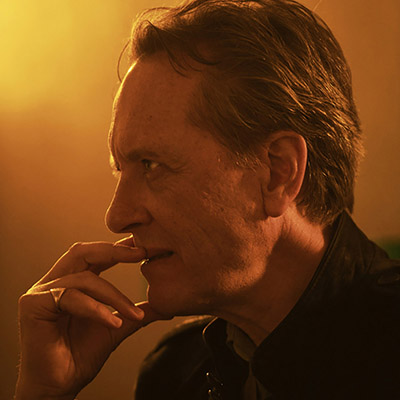
Richard E Grant leans forward on a sofa in a suite on the first floor of the Soho Hotel. His clothes are black, his eyes a washed-out blue; his widow’s peak remains impressively predatory. He has the air of a handsome vulture at a funeral. The lighting is so intimate that I can barely read the questions in my notebook.
“Great shoes,” says Grant, emanating charm. Touched — a sole is flapping off my shoe — I address him as “The great Richard E Grant”.
“Such a tart!” he says.
I feel like a tart, but Grant has been my hero, I explain, since I saw Withnail & I in the mid-1990s — and started watching it on repeat.
“I can only be a disappointment,” he replies stoically.
In the film, he plays a flagrantly failing actor, incandescent with bile and booze. It is an inspired performance that has a hold over many (mainly male) actors who never made it, including me. Yet this man isn’t Withnail in real life. He couldn’t be: for 40 years, he has seldom been jobless and he never drinks (he’s allergic).
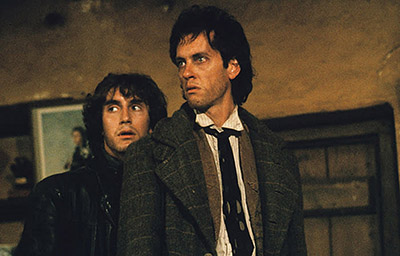 With Paul McGann in ‘Withnail & I’ (1987)
With Paul McGann in ‘Withnail & I’ (1987)© Handmade Films/Kobal/REX/Shutterstock
He does have Withnail’s amazing face, however. “Thank you,” says Grant. “Well, there’s some irony because when I had my final assessment by a professor at drama school, 100 years ago, he said to me, ‘I think in all honesty you will make your career as a director because you’ve shown real talent and promise for that at drama school, but you’re never going to make it as an actor because you look too weird.’ So, to be told the opposite is a pleasure. You’ve made my day.”
His career since Withnail & I (1987) has been eclectic. Movie credits include Larry Lefferts in Martin Scorsese’s The Age of Innocence (1993), a sinister servant in Robert Altman’s Gosford Park (2001); he also starred alongside Steve Martin in LA Story (1991). Less critically acclaimed roles include Clifford, The Spice Girls’ manager, in the film Spice World (1997).
He has been in Game of Thrones, Downton Abbey and Absolutely Fabulous. He has narrated a terrifying documentary about wildebeests, has made two strange series about hotels (he loves hotels) and he wrote and directed Wah-Wah (2005), a film based on his childhood in Swaziland. He also appeared in Girls, partly because Lena Dunham is a fan of The Spice Girls. In other words, he’s been very successful by normal standards, but he isn’t Meryl Streep.
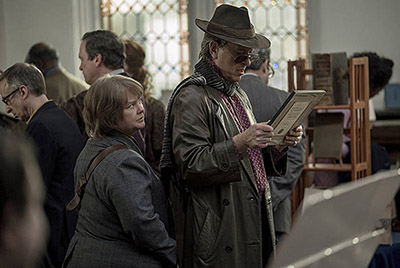 With Melissa McCarthy in ‘Can You Ever Forgive Me?’ (2018)
With Melissa McCarthy in ‘Can You Ever Forgive Me?’ (2018)© Twentieth Century Fox Film Corporation
Nonetheless, he has just been nominated for an Academy Award for his role in Can You Ever Forgive Me?, directed by Marielle Heller and starring Melissa McCarthy. The 61-year-old has been visibly thrilled by this turn of events. His ecstatic reaction to the news has been viewed more than 3.5m times on Twitter.
When it doesn’t happen to you, you accept that’s just how it is
Why such astonishment? “Because I’ve been, essentially, a character, journeyman actor, as they call it, for almost four decades — so I’ve never been nominated.” He was born and raised in Swaziland when it was still ruled by the British (his father was head of education), and his voice is both actorly and imperiously posh.
“When it doesn’t happen to you — and it happens to a very small elite number of people — you accept that’s just how it is. Because that’s the status quo of every actor’s life, really, unless you’re called Judi Dench or Nicole Kidman.”
Or perhaps Mahershala Ali, who has been nominated in the same supporting actor category. Grant insists that Ali — “who is absolutely a brilliant actor and so wonderful in Green Book” — is a shoo-in. And that’s fine, he says: just making the shortlist means that “I genuinely — hand on my heart — feel that I’ve won already”. (At the time of writing, Ali is indeed the bookies’ favourite, with Grant second.)
Set in New York in the early 1990s, Can You Ever Forgive Me? is about the literary forger Lee Israel. McCarthy plays Israel; Grant plays Jack Hock, her louche and inebriated, tail-wagging, HIV-positive partner in crime. The real Hock was American. “Palpably American,” agrees Grant. “He was from Portland in Oregon and he died at the age of 47, and he was tall and blond. And when I said to Marielle Heller — when she emailed me offering this part, six weeks before they started shooting in November 2016 — I said, ‘Do I dye my hair, do I have a facelift and do I play it with an Oregonian accent?’ And she said, ‘No, you don’t dye your hair, you do it as you, as the age that you are’ — I was 60 at that point — ‘and no American accent.’?”
Grant doesn’t do it as himself, exactly — it probably wouldn’t work if he tried. For a start, Hock is flamboyantly camp and usually sozzled. He is also isolated, lonely and staring death in the face. Beneath the bravura, Hock is a seedy, weeping clown. Grant, on the other hand, is sober and only slightly camp; he appears to be brimming with vitality and contentment.How does he approach a part like that? “My first question is always: what is the sex life of this person? What turns them on? Because I think that’s the basis of what everything in life stems from.”
Sex?
“Yes, I think it comes from that. You can meet people and you can know whether they’re shaggers or they’ve not shagged or they’re looking for a shag, or just somebody that is comfortable with that aspect of their life. I think that profoundly affects almost everything about a human being.”
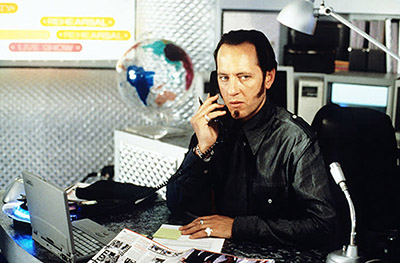 As Clifford, The Spice Girls’ manager in ‘Spice World’ (1997)
As Clifford, The Spice Girls’ manager in ‘Spice World’ (1997)© Alamy/Everett Collection
Indeed, Grant — who has been married for 30-odd years — claims to know whether people “shag” or not just by looking at them, which is unnerving. “You can feel loneliness in people — if somebody’s not had the intimacy that goes with a physical and emotional relationship, it kind of jumps off their skin somehow,” he elaborates. “So, that’s the question I always ask. And I certainly thought that with Jack Hock — his character. He’s somebody, a bit like a Labrador, who will go and shag anybody in sight, if he can get a bed, a bonk or some booze out of them.”
Since we’re on the subject, how does he see Withnail’s love life? “I think that he was so self-obsessed, entitled to a completely narcissistic, self-destructive degree that?.?.?.?I don’t know whether that’s coupled with self-hatred but I think that he probably had no sex. I think he had a poor sex life, unless he turned himself on, I don’t know.”
Wearing the right clothes also helps Grant get into character. “I was given an absolutely extraordinary Spandau-Ballet-past-their-sell-by-date-10-years-too-late-on-an-advanced-middle-aged-man threadbare look by Arjun [Bhasin], the costume designer.”
A decent co-star is no bad thing either. He and McCarthy hit it off “instantaneously”, he says, and their chemistry crackles on screen. How important is rapport like that? “You feel that you are seen, in the truest sense of that word, by another human being — and you therefore trust that person.
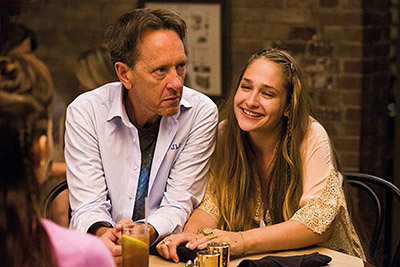 With Jemima Kirke in the HBO TV series ‘Girls’ (2014)
With Jemima Kirke in the HBO TV series ‘Girls’ (2014)© Home Box Office
Then, whatever you’re required to do in a scene becomes something that you don’t even think about. You don’t have to measure yourself.” With McCarthy, “There is no game-playing or subterfuge or upstaging or any of the things that you can deal with in certain sociopathic members of my profession — of which there are quite a few.”
Most truthful acting requires actors to expose themselves in certain deep ways, which makes them vulnerable. For Grant, trust is vital. “Being able to completely trust somebody, you feel like you can play your part in the true, childlike sense of playing — you have no inhibition and you’re completely abandoned to the safety of knowing that person’s not going to dump you in it.”
“Playing” — that’s the heart of being a good actor, isn’t it? Not to grow up in some way? “Yes, not to grow up,” he says. “As you can see, I have the emotional maturity of about a 17-year-old going on seven for the most time.”
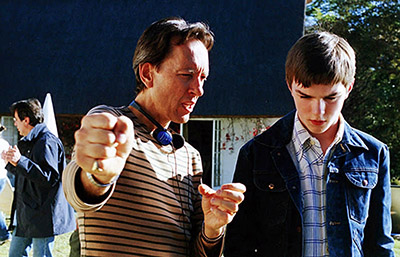 Directing Nicholas Hoult in 2005’s ‘Wah-Wah’
Directing Nicholas Hoult in 2005’s ‘Wah-Wah’© Lions Gate/Kobal/REX/Shutterstock
How does he choose his roles?
“There’s no plan?.?.?.?I’ve taken what has been the best offer at that moment in time — and, usually, it’s because somebody’s turned it down and you’re the fifth choice. But, as somebody pointed out to me, Albert Finney turned down Lawrence of Arabia and gave Peter O’Toole his big screen break, so I understand that it’s just part and parcel of the nature of the job — don’t worry about who has turned it down, just grab the opportunity when it comes.” These are wise words for any aspiring actor — in this dicey world, the future is not plotted, it is prayed for.
Grant asks if I am still an actor — in my heart, at least — and why I gave up. (He seems genuinely concerned.) I explain that I did not get far enough, that I was nervous of auditions and hated not being in control. “As an actor, you are completely at the whim and mercy of everybody else,” he agrees. “They can cut and shape and drop you, or fire you or whatever — and you have no control over that.”
Does that not make actors insecure and paranoid and angry all the time?
“Yes, you’re looking at?.?.?.?Not angry all the time. You can’t be angry all the time, but it certainly makes you insecure, yes.”
I wonder if playing Withnail has inhibited his career in some way. After all, it’s the kind of job — like Sean Connery as Bond, Jack Nicholson in The Shining or Al Pacino in Scarface — that an actor can struggle to get away from. Has Withnail cast too great a shadow?
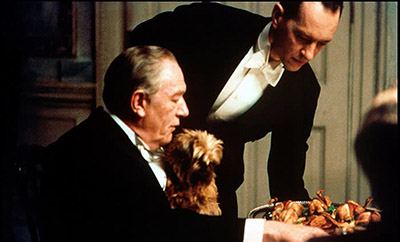 As George, serving Sir William McCordle (Michael Gambon) in ‘Gosford Park’ (2001)
As George, serving Sir William McCordle (Michael Gambon) in ‘Gosford Park’ (2001)© Alamy
“When you put it like that, you make it sound as if it is a burden; I’ve never found it to be so,” he says. “On a daily basis — on the bus, on the Tube or in the street — somebody, somewhere will quote a word or a line from it?.?.?.?And the irony has not escaped me that in playing an out-of-work actor, it has led to every single part that I have had subsequently. I owe my career to having got that part — and to Daniel Day-Lewis for turning it down, thank God, otherwise I wouldn’t be sitting here talking to you today.”
He has kept a diary since he was a boy. The story he tells frequently is that he started writing it after catching his mother making love with his father’s best friend in a car.
Why has he kept this record for so long? “You talk about this thing of control that you don’t have as an actor; it’s a way, at the end of the day, to go, ‘This happened, this is who I met, this is where I was.’ Because there’s still a little boy from Swaziland in me that goes, ‘You’re never going to be allowed into this club — this show business world — that you’ve always longed to be a part of.’ It’s a way of making something that feels unreal be real, because it’s written down. Does that make sense?”
Most actors identify luck as a key player in their lives and he is no exception. About 20 years ago, fellow actor Roddy McDowall outlined how he saw Grant’s career panning out in the future: “And he said, ‘From now onwards, and especially when you hit your fifties, the roles are going to get smaller, your salary will diminish and your recognisability will fade almost completely’ I really thought I’d be put out to field like old Dobbin the Donkey by this point in time, not having all this attention.”
Yet here we are. In December, he will appear in the final Star Wars movie and he might — if Mahershala Ali pulls out — win an Oscar. If he does, will he make a big political speech about #MeToo or Donald Trump or something like that? “I think I’d be in such total shock that I imagine I’d probably just pass out and be the first person to do so on the Oscars’ stage.”
Rumour has it that he plays Obi-Wan Kenobi in Star Wars. Needless to say, there are ludicrous levels of secrecy surrounding the film and, for all I know, he might be playing Princess Leia’s little sister, but still.
How was it playing the role of Obi-Wan?
“Obi-Wan Kenobi was my finest hour,” says Grant, not missing a beat. “I’ve loved playing Obi-Wan Kenobi, yes. Brilliant role.”
Following in the footsteps of his role model, Alec Guinness?
“Exactly, yes. I channelled him completely.”
This could be a tease. For a “journeyman actor”, it’s surprisingly hard to tell.




